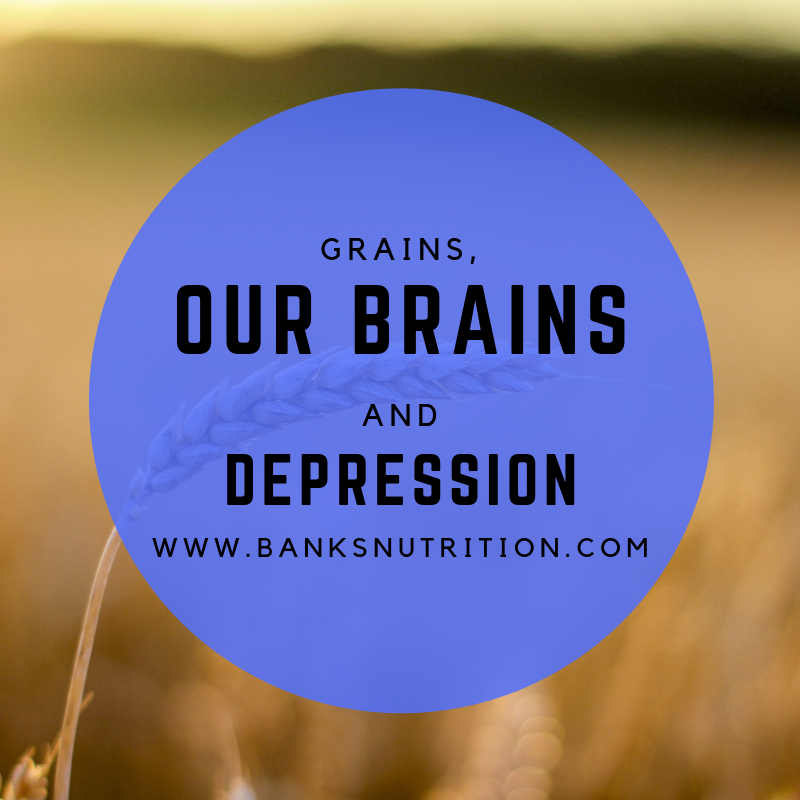
Grains, Our Brains and Depression
September 12, 2013
-
Grain consumption has significantly increased in most diets which can cause difficulty in the brains ability to produce neurotransmitters such as serotonin
-
Serotonin is the neurotransmitter that is thought to be involved in depression, anxiety, and some eating disorders
-
It appears that the common grains in the western diet interfere with tryptophan blood levels and transport into the brain for serotonin production which may be a factor in disorders related to low serotonin availability such as depression
Perhaps the most significant change is human dietary patterns over the past several generations besides the addition of large amounts of sugars, has been the large shift towards increased grain consumption. Recent research is showing that this shift is causing difficulty in the brain’s ability to produce neurotransmitters such as serotonin. Serotonin is the neurotransmitter that is thought to be involved in depression, anxiety and some eating disorders. The commonly used drugs to treat depression are selective serotonin reuptake inhibitors. Their job is to keep what serotonin there is in the brain active longer. The link below shows a short animation about the activity of serotonin the brain.
http://www.argosymedical.com/Nervous/samples/animations/Serotonin%20Pathways/
Grains, like most natural foods contain a mix of content supplying some carbohydrate, some fat and some protein. The protein content, however, is different than that from other sources such a meat and dairy in the amount of the different amino acids present. When we digest protein, it is ultimately broken down into various amino acids which the body uses for different tasks. One of these amino acids, tryptophan is used by the brain to make serotonin.
The use of tryptophan in the body is highly dependent on the mix of other amino acids that are available at the same time. The different amino acids compete with each other for transportation around the body and into different areas such as the brain. Tryptophan is one of the least competitive amino acids, so when many of the other more competitive amino acids are present, tryptophan is poorly utilized.
Here is where grain comes in. Grain proteins contain a different mix of amino acids, a mix that flavors the utilization of the other amino acids rather than the tryptophan that is available. A recent study compared the blood tryptophan levels following the ingestion of 3 different protein meals. They also looked at the ratio of the blood tryptophan to the other more competitive amino acids. This measure has been shown to accurately predict how well tryptophan can be transported into the brain.
A dairy protein called alpha-lactalbumin resulted in a 300% increase in blood tryptophan and a 50% increase in the tryptophan ratio. This predicts that the large increase in blood tryptophan will result in higher transport into the brain for serotonin production. The other two proteins were wheat gluten and zein which is the main protein in corn. Both resulted in decreases in blood tryptophan and decreased blood tryptophan ratios. Not only did these two common grain proteins result in lower absorption of what tryptophan was available in them, they resulted in much higher levels of other amino acids that limit the ability to transport tryptophan into the brain.
The conclusion of the study was that different protein sources are likely to exert different influences on brain chemistry and behavior. It appears that the common grains in the western diet impede tryptophan blood levels and transport into the brain for serotonin production. This may be a significant factor in disorders related to low serotonin availability such as depression.
In addition to the tryptophan transport mechanism above, a high grain diet affects brain serotonin through other mechanisms. A high grain diet is generally pro-inflammatory by virtue of its high omega-6 fatty acid content and by the tendency for grain peptides such as gluten to induce allergic sensitivities. Inflammation causes the use of brain tryptophan to produce quinolinic acid which heightens pain signaling and diverts tryptophan away from the serotonin production pathway.
An excellent book on the subject called Grain Brain is scheduled for release shortly.
https://www.drperlmutter.com/about/grain-brain-by-david-perlmutter/
The author is a board certified neurologist who specializes in the treatment of brain dysfunction.
The striking rise in depression rates highly suggests that changes occurring in our lifestyle may be driving them. Perhaps at the top of the list is diet. We spend billions annually on drugs that try to make serotonin function longer in the brain but spend very little time examining why the brain may not be making enough to begin with.
Our diet contains many times the amount of grain than did that of humans 10,000 years ago, yet our genetic makeup is more than 99% identical. Grain consumption has increased 300-400% in just the past century with the US daily intake averaging 8 servings/day. This shift to a grain dominant diet has not been without adverse impact. Depression is just thought of be one of many related problems.